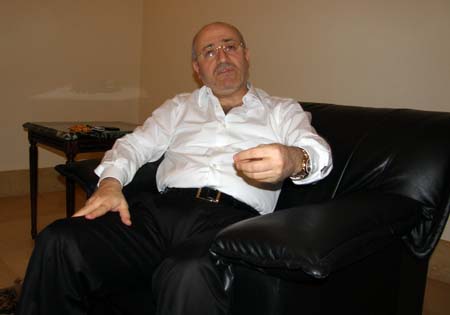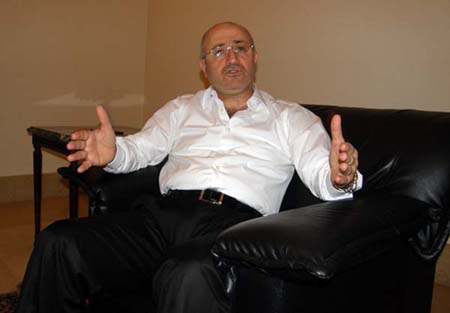Lebanon has not signed the Arab broadcast charter ratified by the region's information ministers, Information Minister Ghazi Aridi said in an exclusive interview, denying earlier media reports and insistence by various experts.
The controversial non-binding 13-page charter is entitled "Principles for Organizing Satellite Radio and TV Broadcasting in the Arab Region" and was released in Cairo February 12. It is the brainchild of Egypt and Saudi Arabia. Only Qatar has expressed reservations about it.
Critics fear it could be the precursor to an anticipated crackdown on maverick channels like Qatar's Al Jazeera that has long alienated Arab regimes with its special brand of provocative news reporting and challenging talk shows.
The pan-Arab daily Al Hayat had quoted Egyptian Information Minister Anas Al Fiqi as saying the charter's adoption by majority vote made it binding and that wide-ranging discussion on an implementation mechanism was in the works. Lebanon's Assafir daily said Lebanon had signed.
But Aridi insisted Lebanon had not gone along with the maligned document and that it contradicted the spirit of more media freedom he continues to seek for his country.
Q: Why is there so much confusion about whether Lebanon signed a document that seems to limit press freedom and did you sign the Arab information ministers' broadcast media charter?
GA: Nobody signed the charter. There was no signature on any document. There was a general ratification of principles of the charter. Unfortunately, this was carried live on TV in the presence of hundreds of journalists.
It was called a "guidance" document and ministers agreed that it was non-binding. That was in the closing session's report.
Q: Why did Lebanese papers report that you'd signed the charter?
GA: That's a problem of how journalism is practiced here. One signs an agreement, a treaty, a convention, a partnership program, etc., not a guidance document.
I'm not the only one who didn't sign. None of the other information ministers signed. On the contrary, the closing statement exploded on the air, was broadcast and is archived and available for all to hear and see. I repeat, it's non-binding guidance.
 Lebanese Information Minister Ghazi Aridi (Abu-Fadil)
Lebanese Information Minister Ghazi Aridi (Abu-Fadil)
I went further to urge for a greater margin of (media) freedom, taking into account each country's special conditions. I told the ministers that Lebanon was the first (Arab) country to have broadcast media legislation. We're the first (Arab) country to have private broadcast media.
Since its inception, Lebanon has been a country of freedom. I can't take it backwards. I would never head in that direction. The others went along, Syria, Libya, even Qatar, which expressed initial reservations.
I'm surprised at (daily) Assafir and New TV (of Lebanon) since I spoke with them. I gave them the minutes of the ministers' meeting that I took. My beef isn't that this was reported but that it was taken out of context. In fact, I benefit from the discussion.
If one is to take issue with the charter, one can't just say: "You (ministers) signed the document." Nobody signed it.
Q: So how did it all come about?
A: It emerged from the need to have legislation in some countries. I fully agree with the need to organize and regulate the media.
If someone tries to bar you from uplinking to a satellite, what would you do? We've been there in Lebanon. We need laws and order to prevent countries from arbitrarily cutting us off. So one needn't become hysterical about regulation but about the content of the regulation.
Again, suppose a country refuses to issue you a broadcast license? The question is: why? Who gets to decide? Are we cherry picking? If someone issues me a license then bars me from broadcasting, why? What guidelines do we use? What measures?
That's why we should be against regulations that constrain, not just rules that organize the industry.
As you know, it's an endless discussion and a dynamic process. Regulation doesn't stop with legislation. There are always amendments.
Q: Is it a non-starter?
GA: I was surprised by my Qatari colleague's comment that his superiors told him Qatar had reservations to the charter although in the committee meetings there were no reservations.
Suddenly, he said the document had to be filtered through legal authorities. Naturally, nobody can implement such a charter without checking his own country's laws. It's elementary.
Even if we all agreed, it wouldn't work unless it became part of our own laws. Some (Arab) countries don't even have broadcast media laws. That's why the ministers saw the charter as a necessity, as guidance, leading to proposed legislation in their respective countries.
Some of the clauses are part of our own laws, and list definitions of audiovisual media, which other Arab countries don't even have.
There are a number of items we glossed over. I told our Qatari colleague that certain items don't apply to me in Lebanon. What's binding is Lebanese law.
Q: Is it still under discussion?
GA: I asked: "Under what measures am I bound?" So it all revolves around politics. The best laws can be trampled by a politician for political gain. If there are political interests, authority can be undermined.
Q: Like the First Amendment?
A: I asked the proponents of this charter two questions: When George Bush first came to power he threatened Al Jazeera. I was against him. I said it openly and wrote about it. And when they (U.S.) hit Al Arabiya I was against them.

"The best laws can be trampled for political gain." (Abu-Fadil)
Al Jazeera had problems with Egypt, Jordan, Kuwait and lately with Saudi Arabia that led to the severing of ties with that country. All these problems preceded the charter. So when the problems arose, did the countries refer to a broadcast charter? Or was it a political game?
Isn't a key reason for the Qatari-Saudi rift Al Jazeera? Didn't it hit the fan when Al Jazeera reported on the controversial arms deal "Al Yamama" (the dove) between Saudi Arabia and Britain, and pointed a finger at Prince Bandar bin Sultan the crown prince's son, who reportedly pocketed billions in commissions?
To my knowledge, the program that aired on "Al Yamama" was produced at the highest levels in Qatar. So I asked the ministers: "If the aim is to protect media freedom, and uncover the truth, you (Qatar) broadcast the first part of the show, why did you stop it after that?"
Why did they prevent Arab viewers from seeing and hearing the truth? And that was before the charter. Qatar clamped down on freedom long before the document was ratified.
The political game was such that once ties were restored with Saudi Arabia, the show was stopped. So when matters are complicated we push a button and bar broadcasts, and when they're resolved we press a button and broadcasts are permitted.
Likewise with religious figures. Either we target all of them or avoid insulting any of them. But one can't be selective to suit one's purposes.
Many of the issues that have arisen leading to this call for stricter rules (and censorship) preceded the actual declaration and did not result from it, or come after it, as were reported in the media.
Q: Why are you still a minister of information? You told me years ago you'd be the last one and that the ministry should be eliminated. What happened?
GA: When I first took over, I did what others couldn't. When we closed down state-run Télé-Liban, 520 employees were laid off. They used to earn more than those at privately owned LBC TV.
During the 2000 electoral campaign, Télé-Liban was used by then president Emile Lahoud against then (and later assassinated) prime minister Rafik Hariri.
If one wants to build state institutions, one doesn't pit them against one political group or another. We reopened it later with a trimmed staff and leaner budget. It was bleeding deficits and the head of the syndicate left with an $800,000 indemnity. It was outrageous.
I've since felt I had to keep an eye on the operation so as not to let it fall by the wayside.